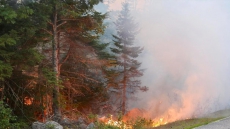HALIFAX — An out-of-control wildfire near Kejimkujik National Park has grown yet again, Nova Scotia's Natural Resources department said Wednesday as crews grappled with challenging weather conditions.
The department said the blaze in the Seven Mile Lake area had been about 15 per cent contained, even as it grew more than 100 hectares to 350 hectares.
But Jim Rudderham, the province's operations manager for forest protection, said that number is slightly deceiving.
"The fire did increase its boundaries — its perimeter — but it's good to remember that within this fire already, there were areas that had not burned. They have burned now," said Rudderham. "So the fire hasn't gone crazy big, it's just consumed some of itself within itself and has gotten a little bigger as well."
Forecasters were predicting unfavourable fire-fighting conditions for Wednesday, making for what the province calls "extreme fire activity."
"It's a beautiful summer day if you're on vacation. For fire fighters, it's going to be very bad," said Rudderham. "It's going to be clear, and warm, and with low humidity and a nice breeze, and that's exactly what fire needs to grow."
Smoke from the fire was moving across the province, reaching the Halifax area. It has affected air quality in Annapolis, Kings, Lunenburg and Queens counties, the province said.
The government said crews, including 20 firefighters that are expected to arrive Wednesday from New Brunswick, will be focused on building guards and reinforcing lines to prevent the fire from growing.
Among the equipment being used in the fight is an air tanker from Newfoundland, three air tankers from New Brunswick, two helicopters and two water bombers from Quebec.
The province says a 10-hectare fire burning in Ten Mile Lake has not been contained and crews were building guards with heavy equipment.
They said a fire in Clyde River is 70 per cent contained and another in Perch Lake has been contained, along with others in West Dalhousie, Maitland Bridge, Greenfield and Collingwood.
The government has restricted activity within forests such as hiking, camping and fishing in a bid to keep more bone-dry woods from going up in flames.




